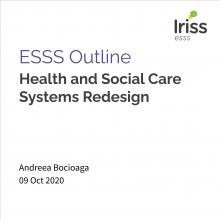What is transformational change?
To use The King’s Fund definition, ‘transformational change is the emergence of an entirely new state, prompted by a shift in what is considered possible or necessary, which results in a profoundly different structure, culture or level of performance’.
It involves a shift in mindset where power is redistributed and changed relationships occur, which in a health and social care context, results in improved lives.
Why is it important?
Policy is in place to support the realisation of transformational change in Scotland. The Scottish Government’s health and social care delivery plan (2016) highlights the need for participation in health and social care, and the Christie commission (2011) asserts that public services must facilitate the empowerment of individuals and the wider community by involving them in the design and delivery of care; participation supports collaboration, leadership and performance.
This presents a fundamental change in how services are designed and delivered - change led by frontline staff and service users with a desire to improve support with and for others, rather than it being imposed on them by external and / or management forces. This type of change requires meaningful collaboration, participation and leadership at all levels.
What are the principles?
Communicate a vision
A vision needs to be communicated that is fundamentally different, but people at all levels find relatable and meaningful.
Distribute leadership
Shared responsibility across professional groups and partner organisations is essential, as well as leadership where there is formal responsibility for change.
Build skills and confidence
For staff buy-in, the importance of a learning culture which emphasises reflective practice and skills development as opposed to just compliance, is necessary.
Make incremental changes
The momentum built by multiple, small changes in a system help to reframe and shift attitudes and behaviours and act as a platform for further changes.
Involve service users and community
The involvement of service users and their families is a key feature of transformational change and makes for user-centred services.
What does this mean for me?
Alexandra Clarke, Senior Service Designer at the Health and Social Care Improvement Hub (ihub)
Within transformational change, design-led approaches play a key role. As a service designer working within the iHub and the Scottish Government, I work to support Health Boards and health and social care teams across Scotland to understand the Scottish approach to service design – and how embedding design-thinking can support them to create long lasting change that works for the system, but more importantly, the people of Scotland.
By focusing on the person’s journey, what their life looks like, the needs they have and challenges that they face, we must get better at collaboratively designing services across our organisational boundaries, so that people’s needs are met in a seamless and cohesive way. Currently, often the way we design services is in silos – it is organisation-led, not service user-led – which can cause people to fall through the cracks and lead to preventable crisis situations.
This shift in approach is a real change to our culture – it requires us to give away our power and recognise that we are not the only experts. We’re all experts in different ways, it’s about acknowledging that input is needed from various fields and that people are the experts in living with whatever condition they require support with. How might we empower people to be involved in the definition, design and delivery of their services? More often than not, our answer to someone else’s problem will not be the right solution, and we need to continue to join the dots, bringing people together to collaborate so we can create really impactful and sustainable services that work for everyone.
It’s okay to not know the answer – we need to give ourselves the space to fully explore the problem space, before we design the solution. It’s about being comfortable with being uncomfortable and teams find this a really scary concept (!) and understandably so, however, they also are starting to see how taking a design-led approach to transformational change across the public sector is also the right thing to do.
If you want to find out more, contact alexandra.clarke2@nhs.net or via design@gov.scot – or check out #SAtSD on Twitter.
Guides and information
iHub summary on transformational change.
Transformational change in health and care: reports in the field, The King’s Fund.



